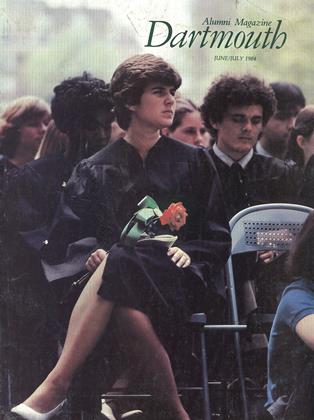Opening the Prison Doors
Two years ago John Harris (Great Neck, N.Y.) was one of a number of students on a Outward Bound Living-Learning Term who became a teacher, tutoring and counseling prisoners at the Woodstock Community Correctional Center. Though the program was scheduled to be phased out at the term's close, Harris and another student decided that the student-prisoner interaction was too valuable and worked to institutionalize the program as a part of the Tucker Foundation. The result is a program that is still going strong today and has involved more than 80 students.
Harris said one goal of the visits is to develop a relationship with the prisoners. "The main thrust is in building some type of rapport and building enough confidence so that when they are released they can say, 'l'm ok. I have enough confidence to get a job . . .
He said that prisoners are usually pretty young and tend to be "guys from bad families. Usually there's a drinking problem. . . . They're the guy that is picked last in the baseball game; they're not the bully." He added that students may be better able to communicate with the inmates. "They're really happy to have someone from the outside come in to see them. It's not someone who is going to come down on them and they appreciate that more than someone lecturing them."
Harris, son of Arthur Harris '54, said the program is also a learning experience for the students. "At first you're scared . . . but then your image of people in prison changes. You find out first that they're people. You find out second that the penal system is a mess and that some thought is needed to improve it."
Nancy Trottier, the correctional center's volunteer coordinator, said Harris has a special knack for making the prisoners feel at ease, a skill he has passed on to other students. "He can come in with the 'I come from a very different background than you but I'm here to help you' type of attitude. He can help them without making them feel he is above them."
The prison program, however, is not the only thing Harris takes seriously. Even though, by his own admission, he was "not an athlete in high school," Harris decided he wanted a team experience and began rowing light-weight crew with a vengeance freshman year. "The teams aspect of it is very meticulous working with eight other guys, strengthening with them to get the most out of it physically and emotionally. The bond is what makes it meaningful."
His coach, Bob Grossman, called Harris "technically one of the best oarsmen. He's very dedicated. ... He shows an awful lot of toughness and really strives for perfection."
Another important part of Harris's life is his role at Dartmouth Hillel where he has served as president and his commitment to Judaism. "As president, I focused a lot on Jewish academics and Jewish issues and helped form the Committee on Jewish Academics to determine what academic programs here are needed to have a well-rounded Judaic education."
In spite of his devotion, Harris, who said he would like a position in "human resource management. . . trying to get people to work better together," will be the first to tell you that religion is not the hottest topic on campus. "I think college students all over the country are not into religion. It's not a modern, liberal practice. It's pretty medieval. . . . It's hard to be religious anywhere. It's not the going thing. But I don't think that's so bad. It should be a struggle."
"At first you'rescared . . . but thenyour image of peoplein prison changes.You find out firstthat they're people
 View Full Issue
View Full Issue
More From This Issue
-
 Feature
FeatureProfessor John Stearns '16: Rara Avis Una
June | July 1984 By Eddie Chamberlain '36 -
 Feature
FeatureCreativity: The Open Dance at Dartmouth
June | July 1984 By Prof. Blanche Gelfant -
 Feature
FeatureWearers of the Green
June | July 1984 By Jim Kenyon -
 Feature
FeatureThe Best Part of My Academic Life Here
June | July 1984 -
 Feature
FeatureMaking it Happen
June | July 1984 By Peggy Sadler -
 Feature
FeatureThe Quiet Good Man
June | July 1984 By Young Dawkins '72
Brad M. Hutensky '84
-
 Feature
FeatureNine From '84
JUNE/JULY 1984 By Brad M. Hutensky '84 -
 Feature
FeaturePLATT
JUNE/JULY 1984 By Brad M. Hutensky '84 -
 Feature
FeatureCALLAHAN
JUNE/JULY 1984 By Brad M. Hutensky '84 -
 Feature
FeatureBURNLEY
JUNE/JULY 1984 By Brad M. Hutensky '84 -
 Feature
FeatureCARSON
JUNE/JULY 1984 By Brad M. Hutensky '84 -
 Feature
FeatureGISH
JUNE/JULY 1984 By Brad M. Hutensky '84
Features
-
 Feature
FeatureArt Collection Enriched
January 1961 -
 Feature
FeatureMay 17 Event to Salute Eleazar's Starting Point
MAY 1969 -
 Feature
FeatureWind Roses
DECEMBER 1998 By Ann de Forest -
 Feature
FeaturePsycho-Social Dynamics and the Prospects for Mankind
DECEMBER 1983 By Charles E. Osgood '39 -
 Feature
FeatureCleaning Up La
JUNE 1997 By Jim Newton '85 -
 Feature
FeatureThe Fifty-Year Address
JULY 1959 By JOSEPH W. WORTHEN '09

